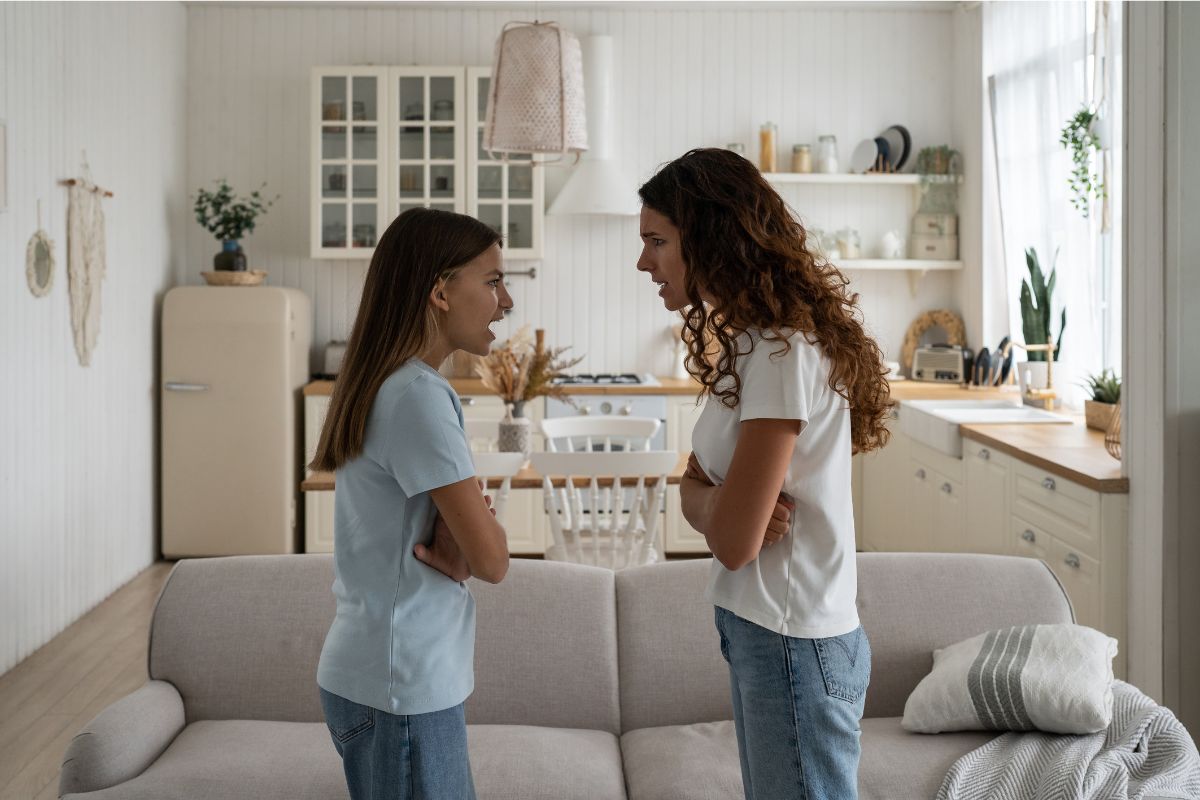I Lost My Cool With My Teen: What Parents With Teenagers Can Do After a Big Fight
Arguing with your teen? Here’s what parents with teenagers can do to rebuild trust, repair the relationship, and reconnect after a fight. Navigate parenthood with some of these tips.

We all lose it sometimes.
The teenage years can be intense, and as a parent, you’re only human. You feel things too. Sometimes your teen’s going to do something that really sets you off. Maybe you raised your voice or said something you regret. Hey, it happens to all of us.
If you’ve just had a big fight with your teen and now the silence feels awkward and heavy, you might be wondering how to patch things up without making things worse. Many parents with teenagers find themselves in that spot after a blow-up. Things may not feel great right now, but there's always a way forward, as long as you're showing up.
Sometimes you may feel like you're trying so hard to keep things together while figuring out how to talk to your teenager without triggering another argument. Truthfully, it's hard to find the right words, especially when emotions are running high on both sides.
So, let’s dive into what you can do after a fight with your teen, how to manage conflict in a way that actually helps, and what teenagers really need from us when emotions run high.

Why Fights Happen: Understanding the Teenage Years
Adolescence is chaotic. Hormonal changes, new experiences, peer pressure, identity shifts, and the push for independence are all happening at once. On top of that, physical changes, developmental milestones, and mental health shifts can make young people feel overwhelmed without even knowing why. Your teen isn't trying to be mean or act out on purpose, sometimes it's just a coping mechanism for what they're experiencing on the outside.
And then there’s us, trying to keep it all steady while juggling our own stress, responsibilities, and expectations.
So when there’s a clash? Not surprising.
Sometimes parents forget that teenagers may not have the tools to express what’s really going on. Underneath the outburst, they might be feeling shame, anxiety, or fear. And yes, while boundaries are important, so is connection, especially during adolescence when the relationship between children and parents is going through a massive shift.
Handling conflicts with your teen with grace and empathy shapes their relationship patterns and emotional responses long into adulthood. Creating an overall positive family environment, even when there's fighting, will help your teen develop healthy coping mechanisms later in their life.
After the Fight: What Parents and Families Can Do
So you snapped. Maybe they did too. Here's how to move forward in a way that supports both of you.
1. Cool down...both of you.
After a heated disagreement, take a breather. Your teen may need space, and you probably do too. That pause isn’t avoidance, it’s about letting your nervous system settle. It’s hard to parent from a good place when you're flooded with emotion.
This is also a good time to reflect on what actually happened, not just what was said, but what was felt. What triggered you? What might have triggered them? These moments are often about more than just the surface issue. Was it behaviour you hadn’t addressed earlier? Or maybe it was the stress of a difficult time in your family life?
2. Don’t underestimate the power of repair
You don’t need to deliver a long speech or write them a letter. Just start small. A simple: “Hey, I’ve been thinking about our fight earlier. I wish I’d handled that differently.”
It matters. A lot.
Many parents worry that apologising will weaken their authority. It won’t. If anything, it models resilience, empathetic leadership, and what a healthy relationship looks like. Teens crave authenticity, especially from the people guiding them through this confusing stage.
3. Validate their feelings, even if you don’t agree with their behaviour
Your teenager might still be fuming or withdrawn. That’s okay. Try something like:
“I know you were upset. I want to understand what was going on for you.”
Validation isn’t about giving in or removing all boundaries. It’s about helping your child feel seen and heard, which is something young people and their families often miss in the heat of a disagreement.
Validation builds trust, and trust builds closeness.
Rebuilding Closeness After Conflict
It can feel weird to go from slamming doors to eating dinner together like nothing happened. But closeness isn’t built in grand gestures...it’s built in the small, consistent moments.
Keep the lines of communication open
Don't ignore them. Ask about their day. Watch a show or movie together. Offer a snack. These simple acts show teens they’re still safe in the relationship, even after conflict.
These gestures help maintain your relationship with your teenager, reminding them that while there might be tension sometimes, the connection isn’t broken. It's about keeping that steady presence in their life, especially when emotions are high.
Conversation doesn’t always need to be deep or serious. It’s about being available, physically and emotionally.
Revisit the rules together
Sometimes fights are actually about a rule that doesn’t quite work anymore. Talk about boundaries after things cool down. If the curfew sparked the fight, ask what feels fair to both of you.
Setting boundaries doesn’t mean laying down the law. It means involving your teen in shaping the expectations and consequences. That shared ownership can make all the difference.
What Teenagers Need After a Fight
Teenagers aren’t little kids, and they’re not quite young adults just yet. During adolescence, the mix of puberty, identity development, and growing independence makes emotional support even more important, even if they don’t ask for it.
Here’s what they might need from you right now:
- Consistency. Keep showing up. Keep the routines. Even if they act like they don’t care, the stability matters.
- Empathy. Teenagers may not say it, but being met with understanding instead of criticism can lower their defences fast.
- Coping skills. Talk openly about stress, conflict, and how you’re managing it. That’s how teens learn to do it themselves.
- Space. Let them cool off. Let them process. Let them come to you when they’re ready.
- Boundaries. Yes, even after a fight. Boundaries aren’t punishment, they’re structure. Teens need that, even when they push back.
- Wellbeing. Don’t just focus on the behaviour. Ask how they’re doing overall. Check in on school, extracurricular activities, sleep, and mood.
If in doubt, just think about how to give your child a sense of stability, support, and care. That’s the base of good parenting teenagers.
What If Big Fights Keep Happening?
If these arguments are happening often, it might be time to look a little deeper. Many parents with teenagers find that ongoing conflict can be a sign of bigger stress beneath the surface. This could be related to school pressure, friendships, mental health problems, or even changes in family relationships.
If your teen tends to yell, speak with a harsh tone, or carry a negative vibe around the house, it doesn’t automatically mean you’ve done something wrong or that they’re a bad kid. Open up the conversation. Don’t shame them for how they react, but calmly name the moment. Let them know how their words or tone affect you. Fighting fire with fire will only fuel the explosion.
In some cases, it might help to speak with a counsellor, checking in with your GP, or accessing certain family services or online platforms that can help open up new conversations and support both parents and teens.
There’s no shame in needing a circuit-breaker. There isn’t one parenting style that fits every household, what matters is finding what works for your unique relationship with your teen and staying flexible as things shift.
A Quick Note on Mental Health and Adolescence
Adolescence is one of the most vulnerable times for developing a mental disorder. If your teenager seems persistently angry, withdrawn, anxious, or unable to cope, it’s worth checking in with a mental health professional.
There are plenty of resources available across Australian family services. Whether it’s through your local GP, school counsellor, or a helpline, support exists for young people and their families.
And if you’re not sure where to start, even chatting to another parent can help.
After the Storm
The big blow-ups don’t have to define your family dynamic. You don’t need to get it right every time. You just need to stay in the game.
The teen years are a wild mix of highs, lows, closeness, and conflict. The pressure is real, on both sides. But after the fight, what matters most is what happens next. Simply show up.
Take a breath. Let it land. Then reconnect. That’s what builds a strong, positive family. One conversation at a time.
Looking for more real-world parenting tips and ways to connect with your teen? Join the Fawn Meets community for relatable advice and support from parents who get it.
Read more
Real connection. Honest chats. Local support.
You’re on the list — check your inbox for your private invite to join the Fawn Meets community.




